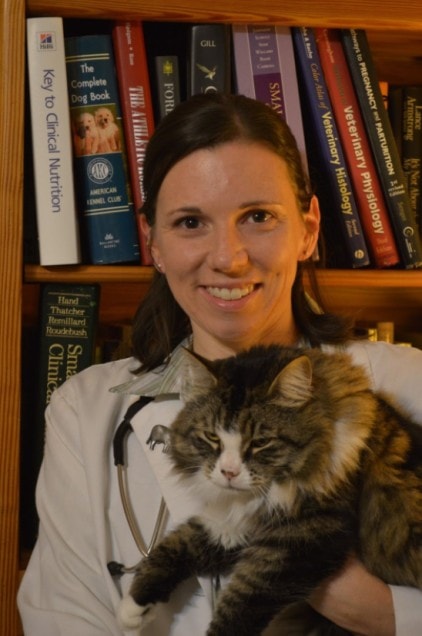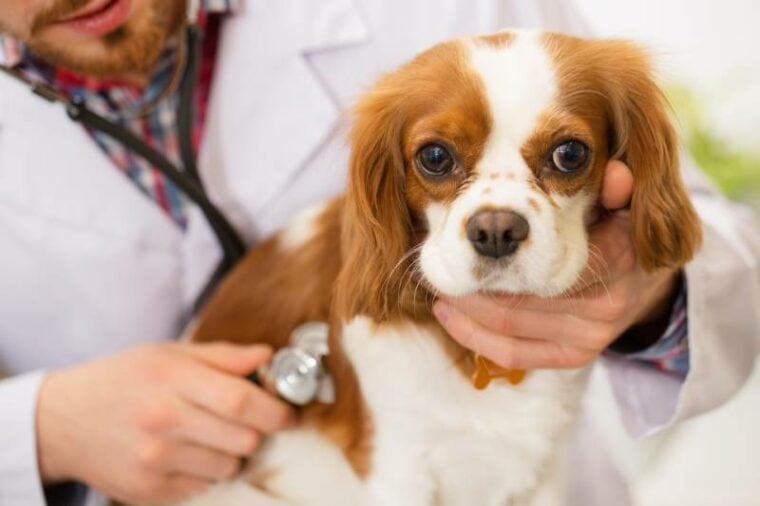
A puppy’s first vet visit can be overwhelming for both puppies and their parents. Knowing what to expect and how to prepare can help calm nerves and make the appointment go as smoothly as possible.
Each vet clinic will have its own procedures, but they generally accomplish the same things. We’ll go over some items that you can prepare before your puppy’s first vet visit and what sorts of things you can expect once you arrive at the vet clinic.
The 5 Things to Prepare Prior to the Visit
1. Previous Medical Records
Bringing any of your puppy’s existing medical records (for example, if you purchased your puppy from a breeder) to your veterinarian’s office will ensure that all your puppy’s medical information is all in one place. Veterinarians can also refer to these records to ensure that your puppy is on top of their vaccination schedule.
Most breeders and dog adoption centers will provide medical records when you first bring your puppy home. However, if you don’t have a copy, make sure to contact them before your first vet visit.
2. Comfortable Carrier
Young puppies can feel overwhelmed when they visit new places. A vet clinic can come with all sorts of sounds and smells that can make some puppies feel anxious. Assembling a cozy carrier can help your puppy stay calm. You can add a soft blanket, a plush toy, and any other of your puppy’s favorite and familiar items.
Carriers will also be a form of additional protection for your puppy. It’s likely that there will be other animals in the vet’s waiting room. A carrier will help keep your puppy in a safe space and removed from all the action.
3. Pet Wipes
It also doesn’t hurt to be prepared for any accidents along the way. Having a set of pet wipes can help you clean up any potential messes made in the carrier and keep your puppy clean during their first vet visit.
If you're looking for an easy, safe way to clean your pet well-formulated wipes like Hepper's Wash Wipes might be just the thing. These premium wipes are designed to gently and effectively remove the dirt and grime that sticks to your pets's fur. The hypoallergenic formula is infused with soothing, moisturizing ingredients that are safe for all life stages.
At Pet Keen, we've admired Hepper for many years, and decided to take a controlling ownership interest so that we could benefit from the outstanding designs of this cool pet company!
4. Pre-filled Forms
Some veterinarians may request you to fill out forms before your first visit. These forms often collect basic personal information, such as your name, address, and phone number. They may also ask for any of your puppy’s existing medical records.
While you can certainly fill out these forms at the vet’s office, your puppy will appreciate having your undivided attention during their first vet visit. If your veterinarian doesn’t send you any forms to fill out beforehand, you can always ask if there’s anything you need to complete and submit before the visit.
5. Stool Sample
Most veterinarians will conduct a fecal exam on your puppy’s first visit. Fecal exams detect internal parasites, and work best on a fresh sample. You may wish to contact your vet beforehand to see if they will be performing this exam during your puppy’s visit so you can be prepared.
If so, make sure that your puppy has a good meal the night before. It’s also helpful to go on a walk before the vet visit. This will give your puppy plenty of time to relieve themselves and expend some energy. Make sure to double-bag the stool sample or place it in a tightly sealed container to prevent odors from permeating as you drive to the vet clinic.
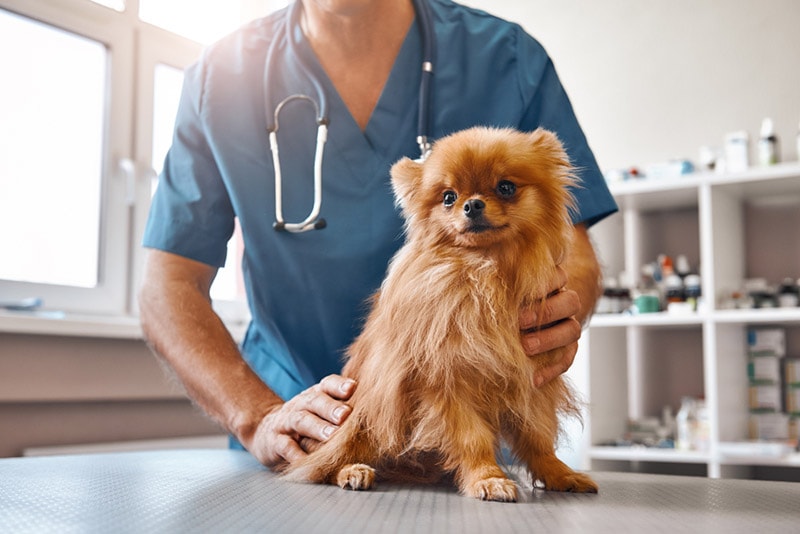
The 6 Things to Expect During the Visit
1. Physical Exam
Once you and your puppy arrive at the vet clinic, you’ll check in with the front desk and wait for your veterinarian to see you. All puppies will go through a standard physical exam. They’ll get weighed, and the veterinarian will check out their whole body, including listening to the heart and lungs. In some cases, your vet may want some additional blood work or a urinalysis to get a baseline of your puppy’s organ function.
2. Diet and Nutrition Requirements
Make sure to ask your veterinarian about any diet and nutrition requirements for your puppy, as puppies of varying breeds and sizes have different nutritional needs. For example, smaller puppies usually have to consume more calories per pound of body weight than large-breed puppies. Having a feeding guide will help with giving your puppy healthy portions of food.
Your vet willl be able to provide information on what your puppy needs to eat for healthy growth and development. They can also recommend specific brands of puppy food that would be good options for your puppy.
3. Vaccine Schedule
One of the main things your veterinarian will start or continue for your puppy is their vaccine schedule. They will administer their core vaccinations, which target canine distemper, canine adenovirus, parvovirus, and parainfluenza. This vaccine is also known as the DA2PP, DHPP, or DAPP vaccine. Depending on where you live and your puppy’s lifestyle, additional vaccines, such as Leptospirosis, may be given or discussed as well.
Most puppies start their vaccine schedules when they’re about 6 to 8 weeks old. They’ll continue to get follow-up vaccines every 3 to 4 weeks until they’re about 16 weeks old. Once your puppy is over 12 weeks old, they can get the rabies vaccine.
4. Neutering or Spaying Questions
If you don’t plan on getting involved with breeding, consider having your puppy neutered or spayed at the appropriate age. Because different breeds have different maturation rates, it’s important to discuss with your veterinarian when it would be best for your puppy to have this surgery. Finding the right timing can immensely help with avoiding complications and will help your puppy have as smooth of a recovery as possible.
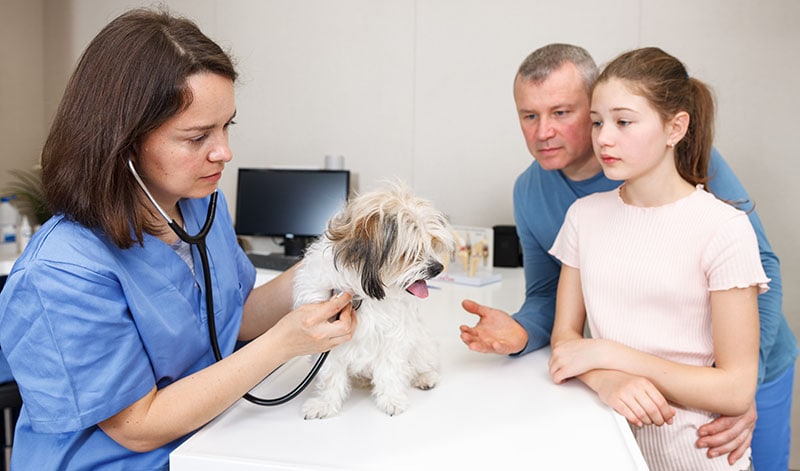
5. Tracking Healthy Growth and Development
It’s helpful to ask your veterinarian about what healthy growth and development look like for your puppy. They may recommend that you track your puppy’s height and weight regularly to ensure that they’re growing at a healthy rate. They can also give you information on best practices for feeding and exercising your puppy, as finding the appropriate amount for each is essential for healthy development.
6. Treats and Rewards
Bringing your puppy’s favorite treats to the appointment can help them stay calm as they go through a physical exam. If your puppy isn’t very food-motivated, you can try keeping them occupied with one of their favorite toys.
Getting through the first vet visit is a huge accomplishment for your puppy. So, make sure to provide plenty of praise and rewards. Providing rewards at the vet clinic can also help build a positive association for your puppy. Just make sure to find a secluded place to give your puppy a treat, as treats can attract and excite other dogs.
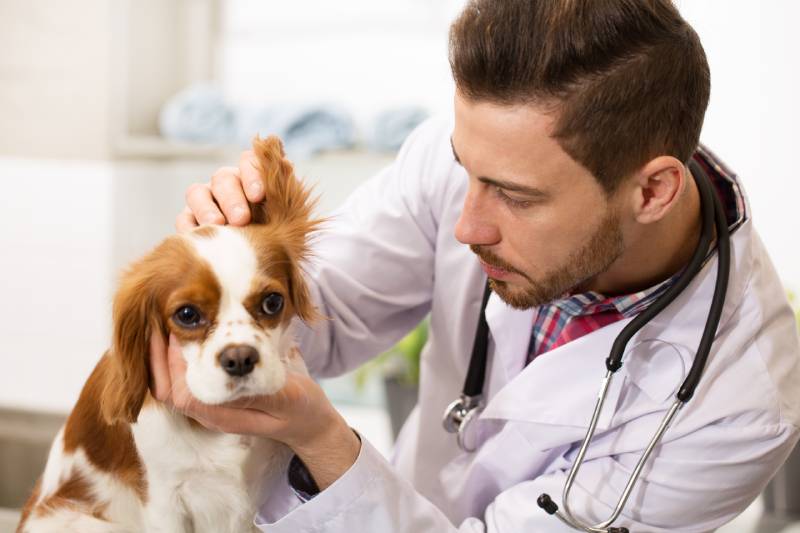
Conclusion
While it’s not possible to anticipate every single thing that will happen at your puppy’s first vet visit, you can do some things to make the experience as comfortable as possible for both of you. Making preparations beforehand can help immensely. It’ll also be beneficial to bring a list of questions so that you won’t forget to request any important information you may want about your puppy. Doing your best to be prepared will help you stay focused on your puppy and make the vet visit a positive experience for everyone involved.
Featured Image Credit: Nestor Rizhniak, Shutterstock

